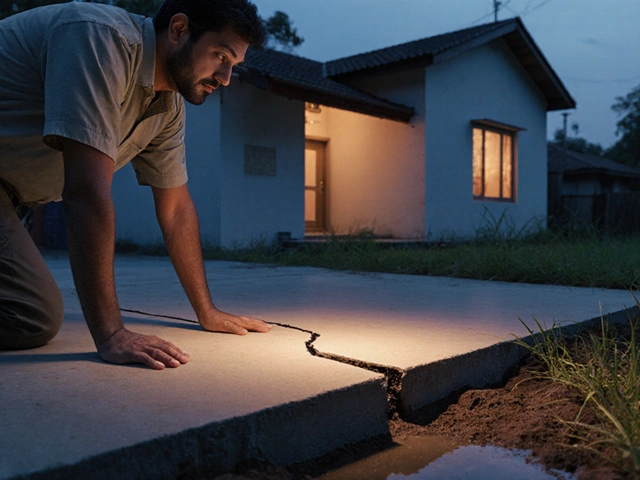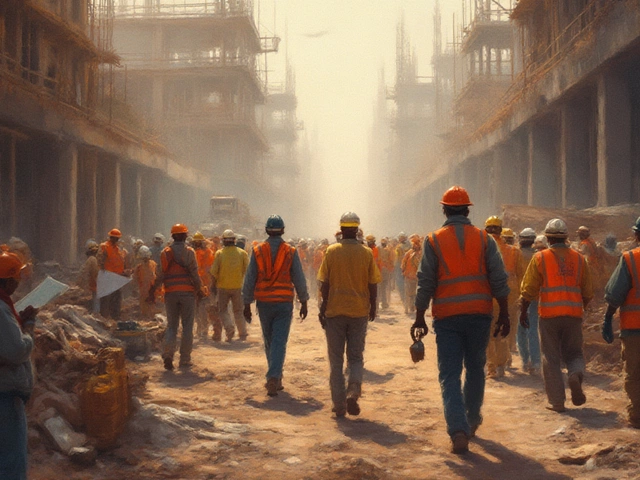Picture this: you dream up a major kitchen redo, maybe something sleek with lots of cabinets—stuff you’ve seen on those home shows. You pull up a few YouTube tutorials. Then real life hits. Just picking the right materials is enough to make your head spin. The plumbing needs rerouting. The permits look confusing. And who’s going to hang those cabinets perfectly straight anyway?
This is where people turn to building contractors. They don’t just swing a hammer; they take on the headaches most of us don’t want to deal with. A contractor lines up the right pros—think electricians, plumbers, tile guys—and makes sure everyone actually shows up. Plus, if something goes sideways, you want someone who’s seen it all before and knows the fix.
Hiring a contractor isn’t about showing off. It’s about getting stuff done right so you can move on with your life. If you’re already juggling work, kids, or—like me—a super curious cat named Whiskers, handing off a big project just makes sense.
- What Building Contractors Do (and Don't Do)
- Skills and Experience: More Than Just Hammer and Nails
- Managing the Chaos: Time, Permits, and Paperwork
- The Safety Factor: Why It Matters
- Saving Money and Avoiding Headaches
- How to Find a Contractor You Can Trust
What Building Contractors Do (and Don't Do)
People often think building contractors just swing by, build stuff, and call it a day. That's only part of it. Their job usually starts way before a single tool comes out and ends long after the last nail is in. If you bring in a contractor for your home or business, here’s what they actually handle:
- Project Planning: They look at your wishes and budget and help figure out what’s actually possible. They handle blueprints, work schedules, and sometimes even coordinate with design folks.
- Permits and Inspections: No one wants a surprise visit from city inspectors. Contractors know which permits you need and line up the legal stuff, so your build passes code without headaches.
- Hiring and Coordinating Trades: This is huge. They bring in the right licensed electricians, plumbers, carpenters, or whoever the job demands—and keep them on schedule.
- Site Supervision: They’re on-site regularly to check quality, solve problems, and make sure work matches the plans.
- Managing Materials: They order what’s needed, handle delivery schedules, and sort out snafus with suppliers.
- Budget Watching: A good contractor stays on top of costs, alerts you about extra expenses, and looks for ways to avoid waste.
But just as important is what building contractors don’t do. They aren’t miracle workers. If you want your bathroom doubled but your house layout doesn’t allow it, even the best can’t do the impossible. They don’t pay for your project out of pocket either—big expenses like materials or permits come out of your budget. And while many have good design sense, formal design work is usually handled by architects or designers, not contractors themselves.
Curious about who actually handles different tasks? Here’s a basic breakdown:
| Task | Handled By |
|---|---|
| New Wiring | Licensed Electrician (hired by contractor) |
| Custom Cabinetry | Carpenter/Subcontractor |
| Permit Applications | Contractor |
| Design Blueprints | Architect/Designer |
| Paint Touch-ups | Painter/Subcontractor |
Bottom line—building contractors are in the business of making tough jobs easier. They coordinate, oversee, and sweat the details so you don’t have to. But, like anyone, they work within limits—so keep your expectations realistic and you’ll be way happier with the results.
Skills and Experience: More Than Just Hammer and Nails
Lots of people think a building contractor is just a handy guy with a truck. But honestly, most jobs need way more than a steady hand and a few power tools. Contractors need real experience—sometimes years—to keep projects on track and avoid rookie mistakes that cost you time and money.
The best contractors know about more than just building stuff. They’re like the quarterbacks of a home project, calling plays and keeping everyone moving. They need to:
- Read blueprints and know how to turn drawings into reality.
- Understand local building codes (which change all the time) so you don’t get hit with a stop-work order.
- Schedule the right trades—like plumbers or electricians—at the right time.
- Spot trouble early, like water damage behind a wall or a support beam that’s not up to code.
- Handle inspections so you’re not stuck fixing work a year later.
Experience saves headaches. If you’ve ever watched a DIYer try to tile a bathroom and end up with wonky grout lines, you get the picture. A good building contractor has probably seen—and fixed—ten versions of every problem on your job site.
It’s worth knowing that many contractors hold state-issued licenses, especially for bigger jobs or anything that could mess with your home’s safety. Some even have specialized certifications for green building or energy efficiency. That’s important if you want to save on monthly bills or get rebates for upgrades.
Just to get a peek at how much technical know-how is involved, check out these essentials most building contractors bring to the table:
| Contractor Skill | Why it Matters |
|---|---|
| Blueprint Reading | Prevents design errors and costly changes |
| Project Management | Keeps jobs moving, avoids delays |
| Regulations & Permits | Makes sure work is legal and safe |
| Trade Coordination | Gets electricians, plumbers, and others working right |
| Troubleshooting | Handles surprise issues (like mold or leaky pipes) |
Bottom line? You hire a contractor because there’s more to a successful project than swinging a hammer—much more.
Managing the Chaos: Time, Permits, and Paperwork
If you've ever thought remodeling would be as simple as buying a few supplies and booking a weekend off—surprise! A rock-solid reason people hire building contractors is because juggling timelines, legal permits, and paperwork is like a full-time job nobody ever asked for.
Let’s talk time. Projects almost never go as planned. Materials get delayed, sub-contractors ghost you, or something random turns up—like electrical wiring not where it's supposed to be. Good hiring contractors means they build a realistic timeline, juggle all the moving pieces, and keep work moving. They push suppliers, call in favors, and spot issues before they become disasters.
The paperwork isn’t just a drag—it’s required by law. Most major work, like electrical, structural, plumbing, or even big deck builds, needs a permit from your local city or county. Not having the right permit can stall your project, trigger fines, and in the worst case, force you to rip out finished work. Contractors know what paperwork you need, who to talk to at city hall, and how to navigate the sometimes-bonkers inspection process.
Here’s a quick look at what contractors actually handle:
- Pulling permits for everything from mechanical to roof work
- Lining up inspections at the right stages (so you don’t get stuck redoing things)
- Scheduling workers and deliveries in the right order
- Dealing with unexpected setbacks or changes that pop up mid-project
- Corraling all the receipts and paperwork for warranty and tax purposes
According to a 2023 survey from Houzz, about 46% of homeowners say dealing with permits and inspections is the biggest hassle of any home renovation job—something pros just handle day in, day out.
If you don’t want your project to stall because you missed a permit or forgot to call for inspection, letting building contractors run the show saves you hours (maybe even weeks) of headaches.

The Safety Factor: Why It Matters
There’s a reason building codes and permits exist—nobody wants a ceiling caving in or faulty wiring sparking a fire. Building contractors handle safety concerns every single day, and it goes way beyond wearing a hard hat. The work itself can seriously hurt someone if done wrong. Did you know falls and electrical accidents are two of the top causes of injury on construction sites? Professional contractors know the regulations inside out and train their teams to avoid these risks.
Your homeowner’s insurance might not help if you skip the pros and something goes south. That’s a shocker for a lot of folks. Licensed contractors usually carry insurance and worker’s comp, which covers accidents—so you don’t get stuck with warnings or hospital bills. This is way less stressful than trying DIY repairs if you don’t know what you’re doing.
Here’s how safety gets handled when you hire the right building contractors:
- They follow updated building codes and get proper permits so inspectors won’t shut down your project.
- Crews use safety gear—helmets, gloves, eye protection—and know the best ways to avoid typical accidents like ladder slips or electrical shocks.
- Contractors schedule work in the right steps—like making sure electrical work is done before drywall goes up—to keep things tidy and safe.
- If something doesn’t pass inspection, contractors fix it before the problem gets worse.
It’s not just about their safety, either—it’s about yours. Poorly done jobs mean hidden dangers long after the crew leaves. Bad wiring, for example, can become a fire risk years later. Building contractors stake their reputation on jobs done safely and up to code, so you can move in (or sell) with peace of mind.
| Common Home Renovation Risks | How Contractors Address This |
|---|---|
| Falls from roofs or ladders | Use harnesses, secure ladders, train workers on proper technique |
| Electrical shocks | Licensed electricians, shut power off before work, regular inspections |
| Mishandling hazardous materials | Proper protective gear, safe disposal practices, compliance with local rules |
The takeaway? Skipping a contractor might save a little upfront, but the cost of an accident—or a shoddy job—can be way higher in the long run. It just isn’t worth the risk.
Saving Money and Avoiding Headaches
A lot of people think hiring building contractors means shelling out more cash, but that’s not always the case. In fact, bringing in the right pro can save you money by stopping mistakes before they get expensive. Ever bought the wrong supplies or messed up a measurement and had to start over? Contractors have seen these goof-ups countless times, so they know how to keep things on track—and on budget.
Here’s a cool fact: home improvement projects overseen by licensed contractors are less likely to run over budget. According to HomeAdvisor, one out of three homeowners who tried DIY ended up spending at least double the cost they expected. This is usually because of rookie slip-ups and unplanned repairs. A contractor knows how to spot these curveballs early and adjust, so you don’t get stuck with a project that just keeps racking up costs.
Another thing—contractors buy stuff in bulk or have supplier discounts. That means you might get materials at a lower price than at your local hardware store. And since they know what permits and inspections you really need, you’re not paying extra for things you don’t. Want to see how costs can add up with and without a contractor? Check out this quick table:
| Expense | DIY Estimate | With Contractor |
|---|---|---|
| Materials | $3,800 | $3,200 |
| Labor/Mistake Corrections | $2,000 | $0 (included) |
| Permit Fines | $500 | $0 |
| Time Spent Off Work | $1,000 | $0 |
| Total | $7,300 | $3,200 |
Let’s also talk about the stress factor. If you miss a permit, use the wrong wire, or schedule trades in the wrong order, you’ll end up with way more headaches than you bargained for. Contractors wrangle the schedule and handle the messy paperwork, so you can avoid phone calls with city inspectors and endless arguments over when the tile guy is coming.
Tip: When you’re talking to building contractors, ask for a clear written estimate and details on how they handle unexpected problems. A good contractor is upfront about costs and explains exactly what you’re paying for—no surprise bills two months later.
How to Find a Contractor You Can Trust
If you’re serious about that home renovation or repair, picking the right building contractors is one decision you don’t want to mess up. Some contractors show up late, cut corners, or disappear when you need them most. Others are worth every penny. So how do you tell the difference?
Start by asking friends, neighbors, or even your local hardware store who they’d personally recommend. Word-of-mouth is gold here—no glossy ad can beat real-life results. You might be surprised how many people love sharing their tales of contractors who saved the day (or wrecked their weekend).
Next, check online reviews, but don’t take just one site’s word for it. Look at Google, Yelp, and the Better Business Bureau. The best building contractors will have plenty of feedback and a knack for handling both praise and criticism professionally.
Then, pick up the phone. Any trustworthy contractor should gladly:
- Show you their license and proof of insurance (this is a must—never skip it)
- List at least three recent references, ideally for similar jobs
- Give you a detailed written estimate, breaking things down line by line
If they fumble on any of this or give you vague answers, move on.
While you’re checking credentials, ask about past jobs. Photos of completed projects, especially before-and-after shots, say a lot. And don’t forget a little chat about timelines; you want someone who’ll stick to the plan, not drag things out forever.
For bigger jobs, it helps to see how many projects they juggle at once. According to a 2024 survey, contractors who work on more than five homes at a time are 35% more likely to miss deadlines. Here’s what that looks like:
| Number of Projects | On-Time Completion Rate |
|---|---|
| 1-2 | 91% |
| 3-5 | 78% |
| 6 and up | 59% |
One last tip: Trust your gut. If a contractor seems pushy, dodges questions, or suddenly drops their price without explanation, something’s off. Good building contractors will be straight with you from the first chat. Expect clear quotes, solid timelines, and honest answers. Anything less—keep looking.






